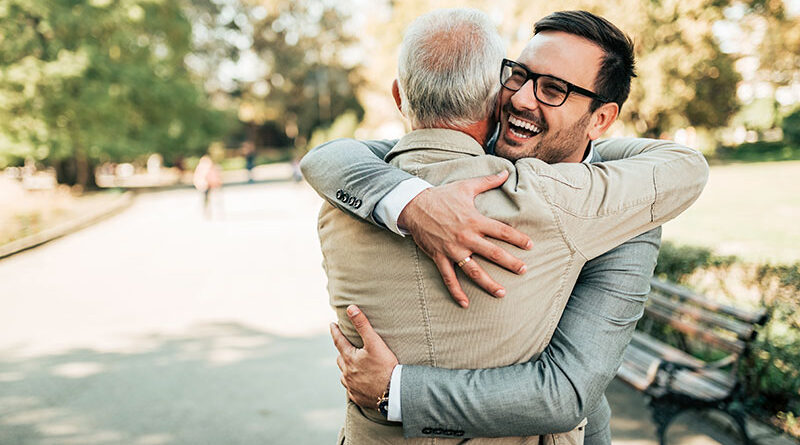Can We Hug Yet?
Experts field questions about nagivating pandemic’s ‘reentry period’
By Margaret McCormick
Remember hugs and handshakes? Crowding into a theater for a concert or movie? Sitting down with a table of strangers at a wedding reception? Sharing a cubicle with co-workers all day — and stepping out for a drink after work?
These things seem like a distant memory, but they’re also the things we think about when we contemplate easing back into the world after more than a year of mostly staying at home.
Will we always have to wear masks? Is anyone else nervous about returning to the office? Can we hug yet? Do we still need to wash our hands 120 times a day? When will life return to normal? What is normal? What is our work life and social life going to look like going forward? I’m vaccinated! Are you?
So. Many. Questions.
According to the Centers for Disease Control and Prevention, more than half of adults in the United States have received at least one dose of coronavirus vaccine and more than a third have been fully vaccinated. That said, a recent survey by KFF, an endowed nonprofit organization providing national information on health issues, showed that there are still many people who remain vaccine-hesitant and in “wait and see” mode. Thirteen percent of KFF survey respondents said they will “definitely not” be vaccinated.
As we take small steps to return to at least some sense of normalcy, there are still reasons to be concerned about COVID-19 — such as variants — and plenty of COVID-19-related conversations to be had. And sometimes those conversations can be awkward.
Take, for example, the topic of returning to the workplace — after more than a year of working remotely.
Michael Sgro, a business and leadership coach based in downtown Syracuse, says some people have deep anxiety about reentering the world and returning to their places of employment.
“Behaviorally we are all a bit different,’’ Sgro says. “Some people can’t wait to get back. Some people are prone to be nervous about reentry. These are people wanting harmony and no ripples in the water. But this is a kind of ‘ride the rapids’ environment.
“Most of the anxiety over returning to work is that people are afraid,’’ Sgro adds. “They will need the most assurances from employers that things are safe. They will need something like a step-by-step, back-to-work timeline. Give them time.’’
By this point, we are generally well-schooled in the reasons for and benefits of physical distancing. Even when fully vaccinated, it is recommended that we continue to wear masks, avoid large gatherings and keep a distance from people — especially indoors. But we all have a friend, family member or colleague who leans in too close sometimes or likes to greet people with a big bear hug. What’s a person to do?
First, remember that it is OK to have boundaries. If someone in a work or social situation isn’t giving you enough distance, try saying something like: “Do you mind giving me a little more space, please? Thank you.’’
That’s the recommendation of the Emily Post Institute, a Vermont-based family business that bears the name of the woman synonymous with proper etiquette.
Smile through your mask — don’t say it with a grimace, an article on the institute’s website suggests. “You want to have an upbeat tone to your delivery, no edge whatsoever (think of that person you know who is always upbeat or sounds cheerful).’’
Daniel Post Senning, great-great grandson of Emily Post, author of several etiquette books (including “Emily Post’s Etiquette — 19th edition’’), and co-host with his cousin, Lizzie Post, of the “Awesome Etiquette’’ podcast, says the institute and its leaders are fielding many questions about navigating what he calls “the reentry period.’’ Many of the questions concern workplace matters and social engagements, like hosting and attending bridal and baby showers.
A big question of the moment is: Are you vaccinated? Inquiring minds want to know but aren’t always sure how to ask. It’s a seemingly simple question, but also one that feels intrusive, in part because of the differences of opinion the pandemic has brought to the surface. Not everyone wants to get vaccinated or sees the benefits of doing so.
“I don’t think it’s a completely unrealistic question to ask someone these days, particularly if there’s a purpose to the question,’’ Senning says. “On the flip side, our health is a private matter. You can ask it with an opt-out for them: ‘I’m curious… I’m wondering if you would be willing to share if you’re vaccinated.’ That’s sort of a formal ask.’’
Krystine Batcho, a professor of psychology at Le Moyne College, says questions regarding vaccination should be asked thoughtfully and respectfully. “I think it should not be such a direct question because of privacy concerns,’’ Batcho says. “Sharing your own experience can be a way of gathering information. Broach the subject in a collegial way: ‘I care for an elderly family member and it would ease my anxiety to know…’ ”
Sgro recommends coming from a place of openness and grace. When speaking with clients, friends and family, he says, he lets them know he has been vaccinated. “I’m forthright about it,’’ he says. “I just got a text from someone saying, ‘I get my second shot next week, so let’s get a cup of coffee after that.’ I don’t think it’s wrong to ask. It’s about safety. It’s about our health.’’
As he does in all business, Sgro advocates a kind, empathetic approach. One might say: “I’m vaccinated and I would love to see you.’’ Or, when in doubt of vaccination status: “I could meet you outside at XXXX.’’
“It’s always about the how — how we ask,’’ Sgro says.

